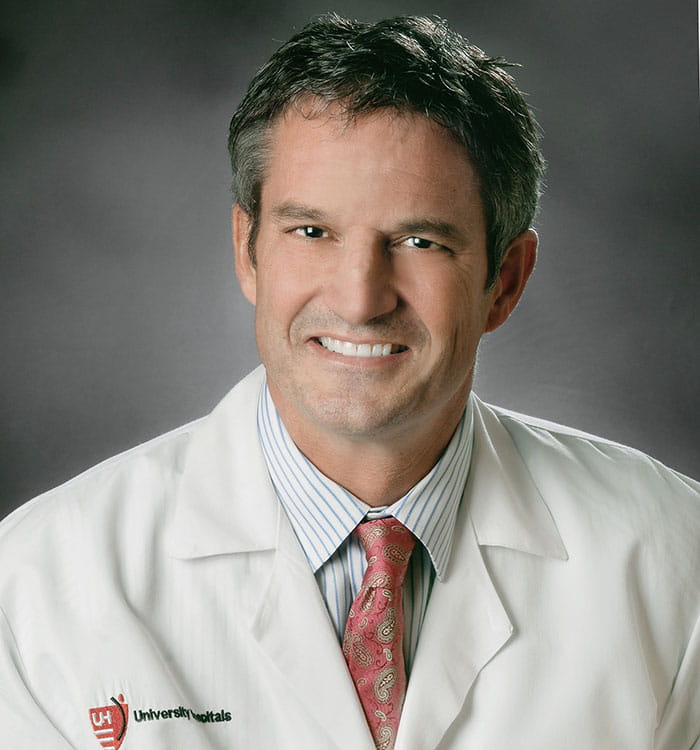Expedited Care for Broken Bones
June 05, 2018
New UH Geriatric Fracture Program streamlines care when time is of the essence
UH Clinical Update - June 2018
 Jeffrey Shroyer, MD
Jeffrey Shroyer, MDWhen an elderly person falls and breaks a hip, the clock starts ticking. Any delay in getting the patient to surgery can decrease the chances of a good outcome and increase the patient’s risk of complications, as well as death, in the first year post-surgery. Timely management of these cases, on the other hand, has been proven reduce complications and increase survival for these patients. Less time in a hospital bed means less chance of pneumonia, blood clots and bedsores – and less exposure to the narcotic medications that can have such a profound effect on an elderly person’s mental status.
UH has long recognized these realities in treating patients with hip fractures. But now these principles are being formalized into a new Geriatric Fracture Program, with pilot sites at UH Bedford and UH Parma medical centers.
“We want to get that patient to the OR as soon as he or she is medically stable and fit for surgery, ideally within 24 hours,” says UH orthopaedic surgeon Jeffrey Shroyer, MD, who is leading the effort at UH Bedford. ”This is an attempt to raise awareness that outcomes are dependent on timely intervention and make that happen on all fronts. If we’re creating an institution-wide program, it creates greater awareness and helps us work as a team together.”
“It can only work with a team approach,” adds orthopaedic surgeon Michael LoPresti, MD, who joined UH on June 1 and will work on the Geriatric Fracture Program at UH Parma Medical Center. “It starts when the patient first arrives in the Emergency Department. The patient has to be seen in a timely fashion. The appropriate physicians, including the orthopedic surgeon and internist, have to be contacted and then begin the process of getting the patient properly ready for surgery. The consulting physicians, such as a cardiologist, have to be notified as well so they can do their evaluation in a timely fashion. Nursing can help get families prepared for their loved one going to surgery within a 24 hour period. Sometimes we’re dealing with patients who have dementia, so decision-making is coordinated through family or powers of attorney. It takes a whole team process to be able to get this program going.”
The teams at UH Bedford and UH Parma are working out these logistics at their sites.
“In general, we try to do this already,” Dr. Shroyer says. “Most of the time we get patients into the OR in 24 hours, but there are impediments, such as scheduling, anesthesia availability and the availability of the consultants. About 50 percent of geriatric patients require cardiac clearance before they go to the OR. We’re just trying to make that more of a streamlined process.”
In addition to providing an expedited care path, the Geriatric Fracture Program teams are exploring different anesthesia options that are less disorienting for elderly patients.
“We’re looking into various options to decrease the sedating effect and complicating effects of anesthesia in the post-operative course,” Dr. LoPresti says. “If we can avoid putting someone under general anesthesia, such as with a spinal or a plexus block, the recovery is definitely better.”
Other aspects of the Geriatric Fracture Program include an intensive physical therapy modality following surgery, a nutritional evaluation and supplement when indicated and an interdisciplinary care program in those patients with mild to moderate dementia.
With all aspects of the program, the goal is to bend the curve and get better outcomes for patients.
“There is a very high mortality rate associated with hip fractures in the first year, particularly in the first few months,” Dr. Shroyer says. “Our goal is to improve those numbers. We know that timely care prevents comorbidities, which is critical.”
“A loss of mobility can significantly change an individual’s health,” adds Dr. LoPresti. “What we’re trying to do is get them back to being mobile again as quickly as possible.”
For more information about the Geriatric Fracture Program at UH, please call 216-844-7200.
Tags:


